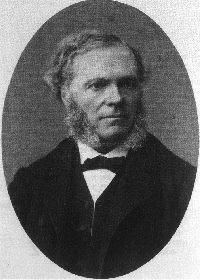Cèsar Franck (1822-1890)
(born Liège, 10 December 1822; died Paris, 8 November 1890). French
composer, teacher and organist of Belgian birth.

Intended by his ambitious father for a career as a piano virtuoso,
he studied at the Liège (1830-35) and Paris (1837-42) conservatories
but found his true vocation only later through organist's appointments
in Paris, chiefly that of Ste. Clotilde (from 1858), and part-time teaching.
His improvisatory skill attracted notice and led to his first major work,
the remarkable Six pièces (1862), though another decade passed
before he was appointed organ professor at the Conservatoire. From the
mid-1870s until his death his creative powers lasted unabated. He wrote
large-scale sacred works, notably the oratorio Les béatitudes (1879),
and several symphonic poems such as Le chausseur maudit (1882) and
Psyché
(1888). But his achievements are evident especially in the symphonic, chamber
and keyboard works in which he made one of the most distinguished contributions
to the field by any French musician. Here, in the Piano Quintet (1879),
the Prélude, choral et fugue for piano (1884), the Violin Sonata
(1886), the Symphony in d Minor (1888) and the String Quartet (1889), his
inherent emotionalism and a preoccupation with counterpoint and traditional
forms found a balance, in turn decisively impressing his band of disciples,
from Duparc, d'Indy and Chausson to Lekeu, Vierne, Dukas and Guilmant.
Features of his mature style, indebted alike to Beethoven, Liszt and Wagner,
are his complex, mosaic-like phrase structures, variants of one or two
motifs; his rich chromaticism, often put to structural use in the 'chord
pair'; and his fondness for cyclic, tripartite forms.
